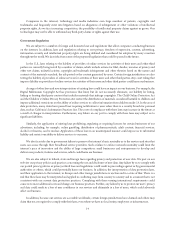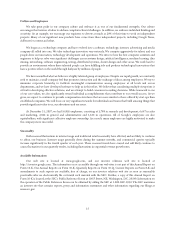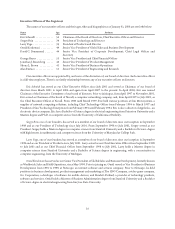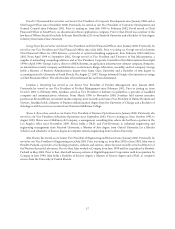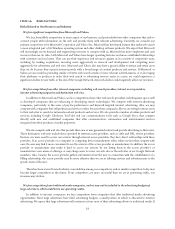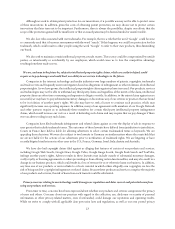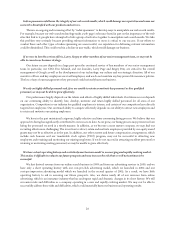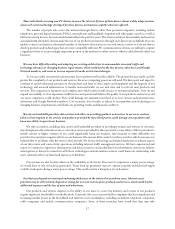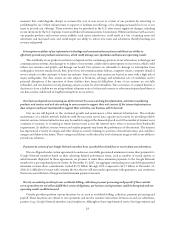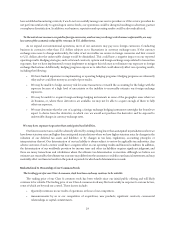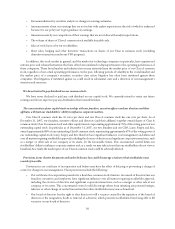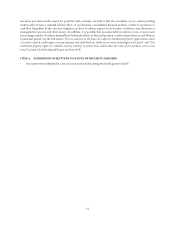Google 2007 Annual Report Download - page 38
Download and view the complete annual report
Please find page 38 of the 2007 Google annual report below. You can navigate through the pages in the report by either clicking on the pages listed below, or by using the keyword search tool below to find specific information within the annual report.policies, any failure or perceived failure to comply may result in proceedings or actions against us by government entities
or others, which could potentially have an adverse effect on our business.
In addition, as nearly all of our products and services are web based, the amount of data we store for our users on our
servers (including personal information) has been increasing. Any systems failure or compromise of our security that
results in the release of our users’ data could seriously limit the adoption of our products and services as well as harm our
reputation and brand and, therefore, our business. We may also need to expend significant resources to protect against
security breaches. The risk that these types of events could seriously harm our business is likely to increase as we expand
the number of web based products and services we offer as well as increase the number of countries where we operate.
A number of legislative proposals pending before the U.S. Congress, various state legislative bodies and foreign
governments concern data protection. In addition, the interpretation and application of data protection laws in Europe
and elsewhere are still uncertain and in flux. It is possible that these laws may be interpreted and applied in a manner that
is inconsistent with our data practices. If so, in addition to the possibility of fines, this could result in an order requiring
that we change our data practices, which could have an adverse effect on our business. Complying with these various laws
could cause us to incur substantial costs or require us to change our business practices in a manner adverse to our business.
Our business is subject to a variety of U.S. and foreign laws that could subject us to claims or otherwise harm our
business.
We are subject to a variety of laws in the U.S. and abroad that are costly to comply with, can result in negative
publicity and diversion of management time and effort, and can subject us to claims or other remedies. For example, the
laws relating to the liability of providers of online services are currently unsettled both within the U.S. and abroad. Claims
have been threatened and filed under both U.S. and foreign law for defamation, libel, slander, invasion of privacy and other
tort claims, unlawful activity, copyright and trademark infringement, or other theories based on the nature and content of
the materials searched and the ads posted by our users, our products and services, or content generated by our users.
In addition, the Digital Millennium Copyright Act has provisions that limit, but do not necessarily eliminate, our
liability for listing or linking to third-party web sites that include materials that infringe copyrights or other rights, so long
as we comply with the statutory requirements of this act. The Child Online Protection Act and the Children’s Online
Privacy Protection Act restrict the distribution of materials considered harmful to children and impose additional
restrictions on the ability of online services to collect information from minors. In the area of data protection, many states
have passed laws requiring notification to users when there is a security breach for personal data, such as California’s
Information Practices Act. We face similar risks and costs as our products and services are offered in international markets
and may be subject to additional regulations.
Any failure on our part to comply with these laws and regulations may subject us to additional liabilities.
We compete internationally with local information providers and with U.S. competitors who are currently more
successful than we are in various markets, and if we fail to compete effectively in international markets, our business will
be harmed.
We face different market characteristics and competition outside the U.S. In certain markets, other web search,
advertising services and internet companies have greater brand recognition, more users and more search traffic than we
have. Even in countries where we have a significant user following, we may not be as successful in generating advertising
revenue due to slower market development, our inability to provide attractive local advertising services or other factors. In
order to compete, we need to improve our brand recognition and our selling efforts internationally and build stronger
relationships with advertisers. We also need to better understand our international users and their preferences. If we fail to
do so, our global expansion efforts may be more costly and less profitable than we expect.
24


